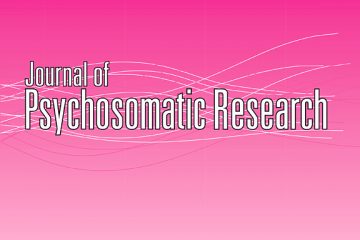The Editor’s choice
The Editor’s Choice October 2017
written by Albert Leentjens, Editor of the Journal of Psychosomatic Research
 Each issue of the EAPM newsletter highlights a research paper that has been published in the Journal of Psychosomatic Research in the past three months: ‘The Editor’s choice’. These papers contribute in a special way to our understanding of psychiatric and somatic comorbidity, psychosomatic medicine and/or integrated care. In this issue: ‘Is psychotherapy for functional somatic syndromes harmful?1
Each issue of the EAPM newsletter highlights a research paper that has been published in the Journal of Psychosomatic Research in the past three months: ‘The Editor’s choice’. These papers contribute in a special way to our understanding of psychiatric and somatic comorbidity, psychosomatic medicine and/or integrated care. In this issue: ‘Is psychotherapy for functional somatic syndromes harmful?1
Research in the field of psychotherapy for functional illnesses focuses mostly on positive effects of treatment while potential negative effects are largely ignored. However, concern for such negative effects of psychotherapy has been expressed by some patient associations, such as the ME association2, and various clinical studies indicate that 3-10% of patients appear to deteriorate after psychotherapy.
A research team of the Research Clinic for Functional Disorders and Psychosomatics of Aarhus University Hospital in Denmark addressed, for the first time, a wide range of potential negative effects of psychotherapy in patients with functional disorders. Eighty patients with severe ‘bodily distress syndrome’ (BDS) were recruited from an ongoing uncontrolled pilot study using acceptance and commitment therapy (ACT) and mindfulness-based stress-reduction (MBSR) to treat BDS (‘BDS’ is a recently proposed diagnosis that captures most of the somatoform and functional disorders under one single diagnosis’). The authors conducted a ‘mixed methods’ study that used both quantitative and qualitative assessments. For the quantitative assessment, patients completed the Inventory for the assessment of Negative Effects of Psychotherapy (INEP) scale. For the qualitative assessments, patients were interviewed following a semi-structured interview guide, focussing on negative experiences during psychotherapy and negative life changes caused by therapy. Negative effects were reported to different extents by 31% of the participants. The most frequent negative effects were dependence on the therapist (12%), feeling down after therapy (6%) and insurance problems (7%). By exploring 27 participants’ subjective experiences of negative effects in the qualitative part of the study, three main themes were identified: therapeutic relations (patients not feeling understood by the therapist), outcome (emotional turmoil, tension in relationship, lack of treatment effect) and transition from therapy to everyday life (challenges after ending therapy). The authors conclude that patients with functional somatic syndromes reported a few specific negative effects, all with a low frequency. Generally, therapy was well-received but some patients did however express negative effects both within and outside the therapeutic context. Just recently another study on negative effects of psychotherapy using the same instrument (INEP) in a slightly different population (psychiatric and psychosomatic inpatients) showed comparable results3.
The identification of specific negative effects of psychotherapy in patients with functional somatic symptoms allows explicit discussion of these issues in the therapeutic setting. Specifically addressing feelings of dependence on the therapist and the challenges of ending the therapy may result in more realistic expectations of treatment and possibly a larger treatment effect. This of course, should be confirmed in further research. Also, the authors call for a more uniform measurement negative effects of psychotherapy in order to be better able to compare such effects between studies.
Albert F.G. Leentjens
Editor
Journal of Psychosomatic Research
- Holsting AF, Pedersen HF, Rask MT, Frostholm L, Schröder A. Is psychotherapy for functional somatic syndromes harmful? A mixed methods study on negative effects. J Psychosom Res 2017;98:113-121.
- ME Association. ME/CFS illness management survey results ‘No decisions about me without me’ (2015): http://www.meassociation.org.uk/wp-content/uploads/2015-ME-Association-Illness-Management-Report-No-decisions-about-me-without-me-30.05.15.pdf
- Rheker J, Beisel S, Kräling S, Rief W. Rate and predictors of negative effects of psychotherapy in psychiatric and psychosomatic inpatients. Psychiat Res 2017;254:143-150.

0 Comments